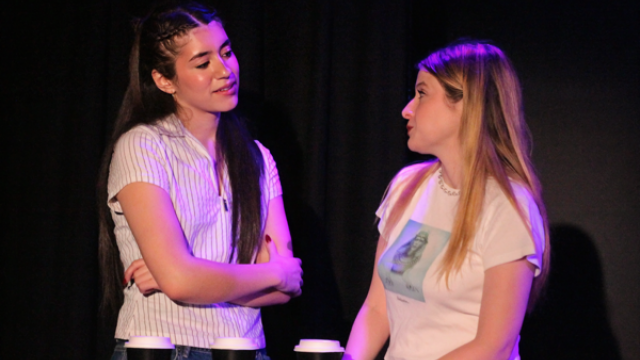The Shape of Things
What seems on the surface to be a story of young love, The Shape of Things is really an indictment of the power of one person to manipulate another. And even though it was written in 2001, years before #MeToo, “consent”, “intimacy training” and the recognition of manipulation and intimidation in relationships, Neil LaBute’s psychological, black comedy still has the power to delude and stun its audience.
Director Kathryn Thomas describes the play as interrogating “how we shape ourselves – and others – often without realising the consequences”. It covers issues such as the real nature of romance, friendship, personal identity, body image, honesty – and the lengths some will go to for the sake of art. Its characters are very real. Its dialogue sharp and economic. Its final message very clear.
LaBute sets the play in a small-town university in mid-west America and cunningly makes the perpetrator of deception a woman. Evelyn is a fine arts student, who is beginning her final thesis. “Strive to make art but change the world” she has been advised. Rather than “change the world” she decides to change Adam, a struggling English Lit student who finds her about to deface a sculpture in the museum where he works part-time.
Unbeknown to Adam, they have met before, and Evelyn has manipulated this meeting, ostensibly to get to know him better – even romantically – then cruelly use him in the name of “art”.
As Evelyn, Bianca Lombardo has a daunting task. She needs to be believable, a strong, young, confident feminist, intelligently flirtatious, philosophically aware, sophisticated. Lombardo makes Evelyn all of this, whilst still maintaining a distance that makes her unreachable.
Everything she seems to be is the opposite of how Adam, played by Victor Xu, sees himself. How could someone so bright, so intellectual, find him attractive?
Charmed, he falls under her spell. Xu makes Adam reluctant at first. He’s intelligent too – but lacks the wiliness of someone like Evelyn. And that wiliness eventually snares him. Slowly his Adam becomes more confident in their relationship.
He relaxes, and trusts. He begins to change his image. His hairstyle, his diet. He gets fitter, loses weight, gives up his favourite jacket. Her suggestions are so “lovingly” made, and seem so carefully reasoned that eventually, under her influence, he even gives up his best friends, Jenny and Phillip.
Jenny and Phillip met through Adam. Phil had been his roommate, Jenny a fellow student. They have recently become engaged and when they meet Evelyne they are planning an underwater wedding.
Phil, played by Nash Williams, is brash, loud, likes a joke and is a bit of tease. Williams makes him even a bit gawky, a complete contrast to Adam – and Evelyn, who skilfully baits him and raises his ire so that he becomes stroppy – and drinks too much.
Isabel Toohey plays Jenny. Toohey’s Jenny is quiet, gentle, a follower more than an influencer. She values her friendship with Adam and is almost overwhelmed by Evelyn’s assertiveness and strong opinions.

When they meet, Evelyn sizes them up and immediately instigates arguments – which she later uses to belittle them in Adam’s eyes. But still she seems open, honest, reasonable …
It is not until the final scenes that she reveals her real self. It is in these scenes that Lombardo really shines. She is aloof, hard, even a little frightening – and very cruel.
Kathryn Thomas knows her play well and ensures her cast find all the nuances and rhythms in the dialogue and the varying depths and dimensions of the characters. Her production is tight and carefully balanced. As well as intriguing its audiences, will give HSC Drama students who are studying Black Comedy the “richer understanding of the theatrical context, character and style” that she mentions in her program notes.
Carol Wimmer
Subscribe to our E-Newsletter, buy our latest print edition or find a Performing Arts book at Book Nook.

